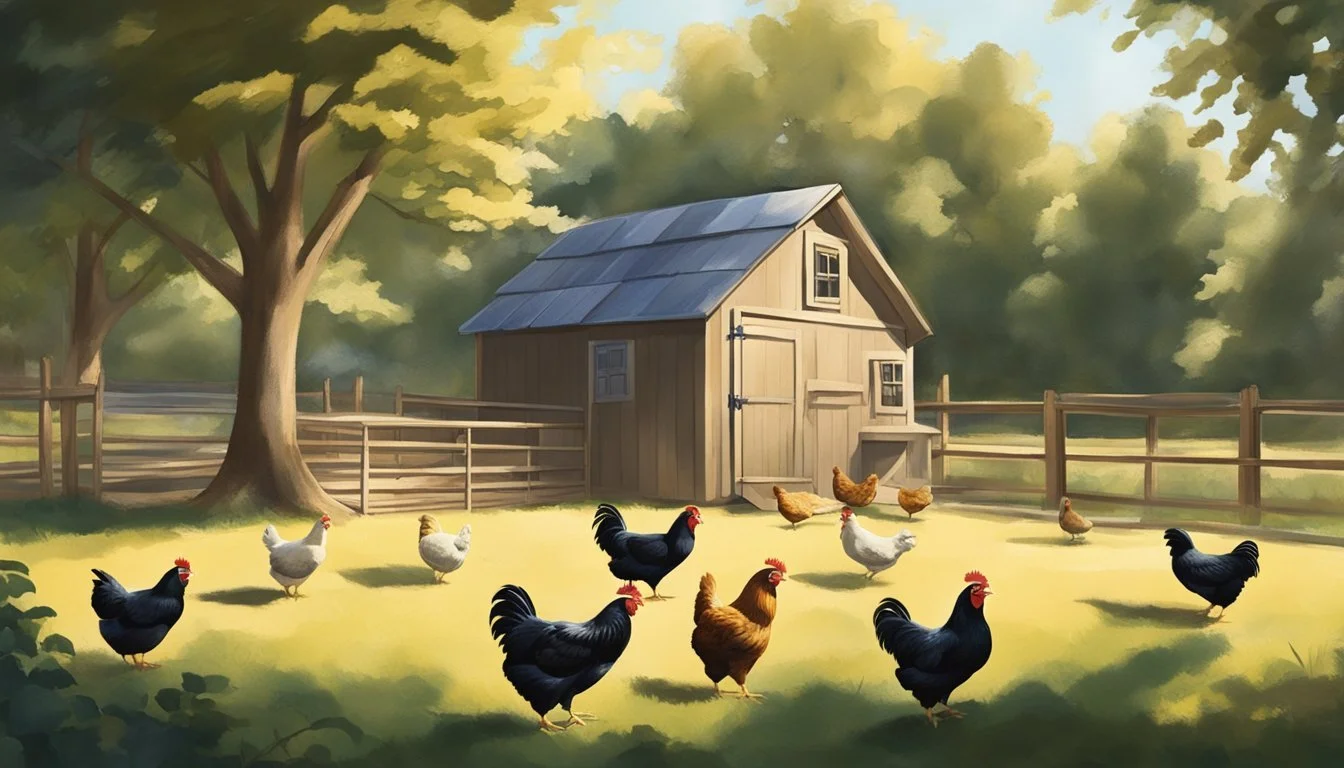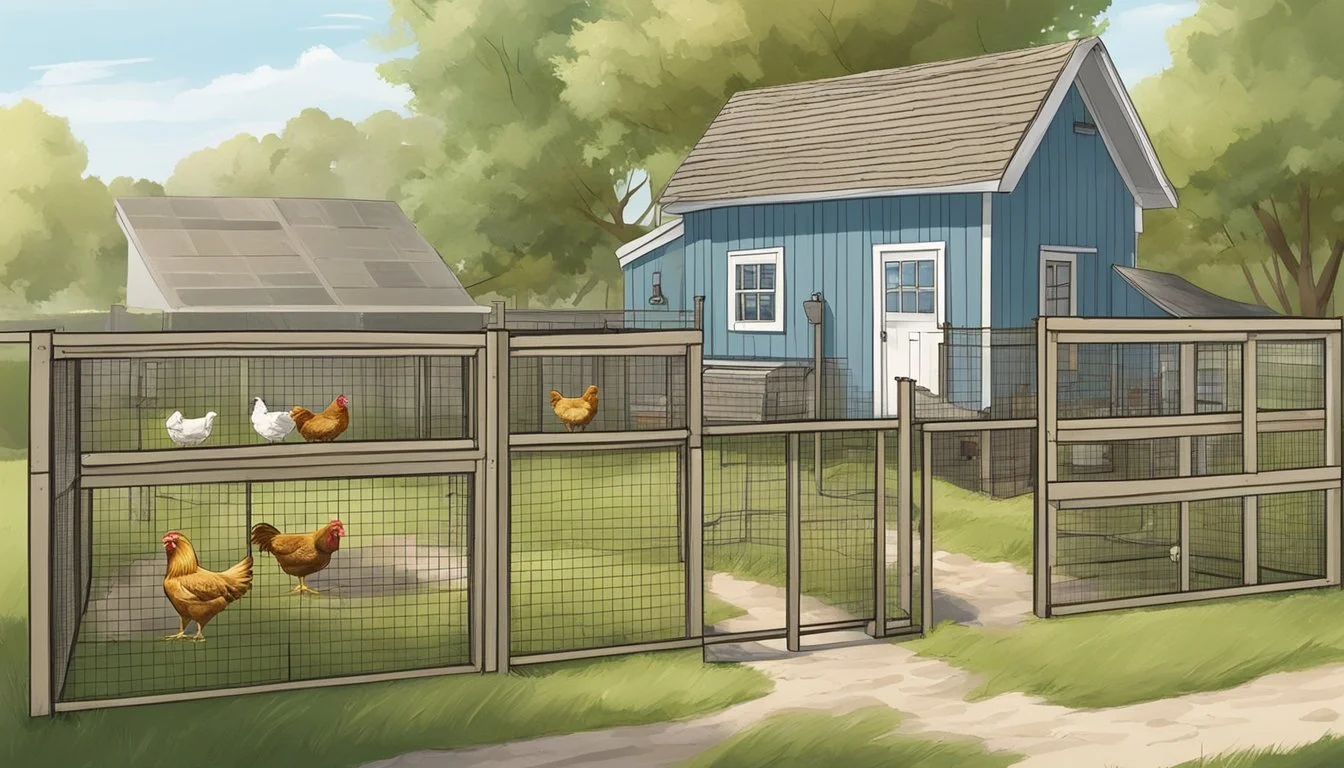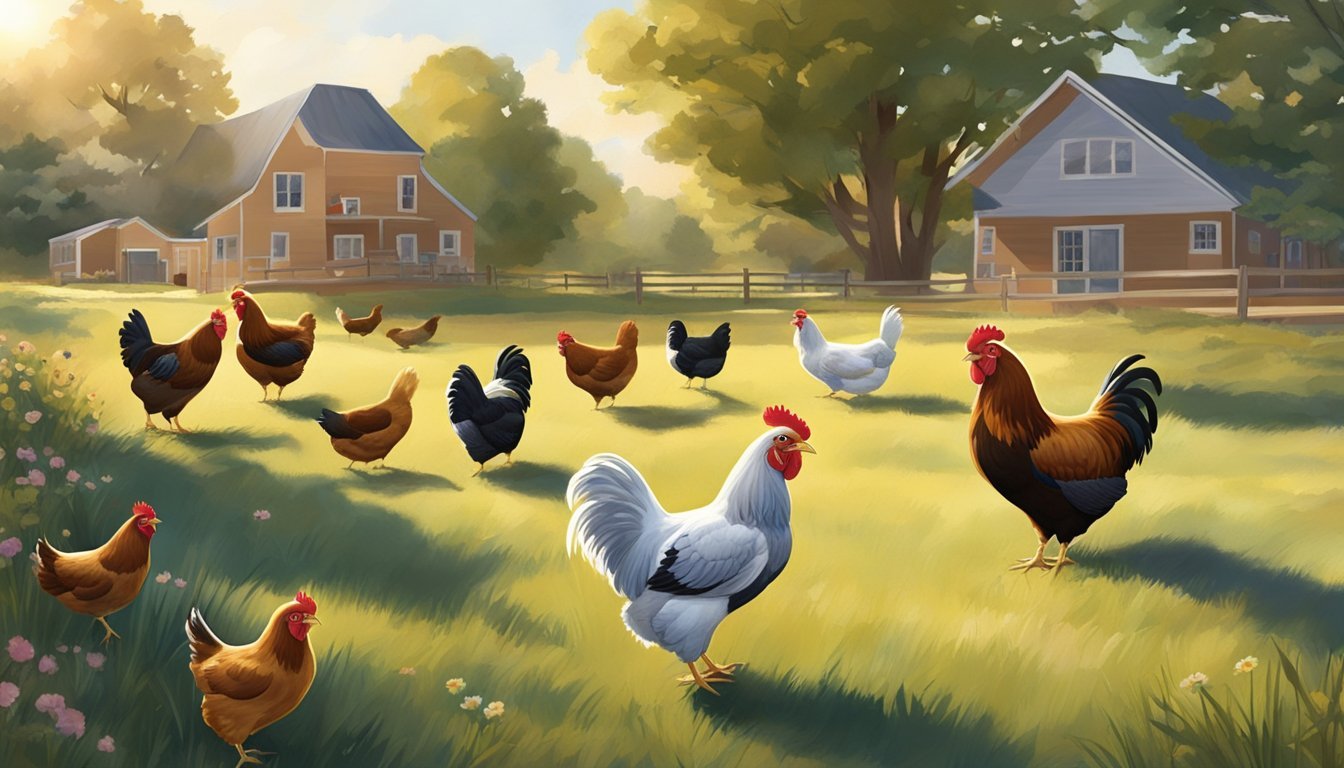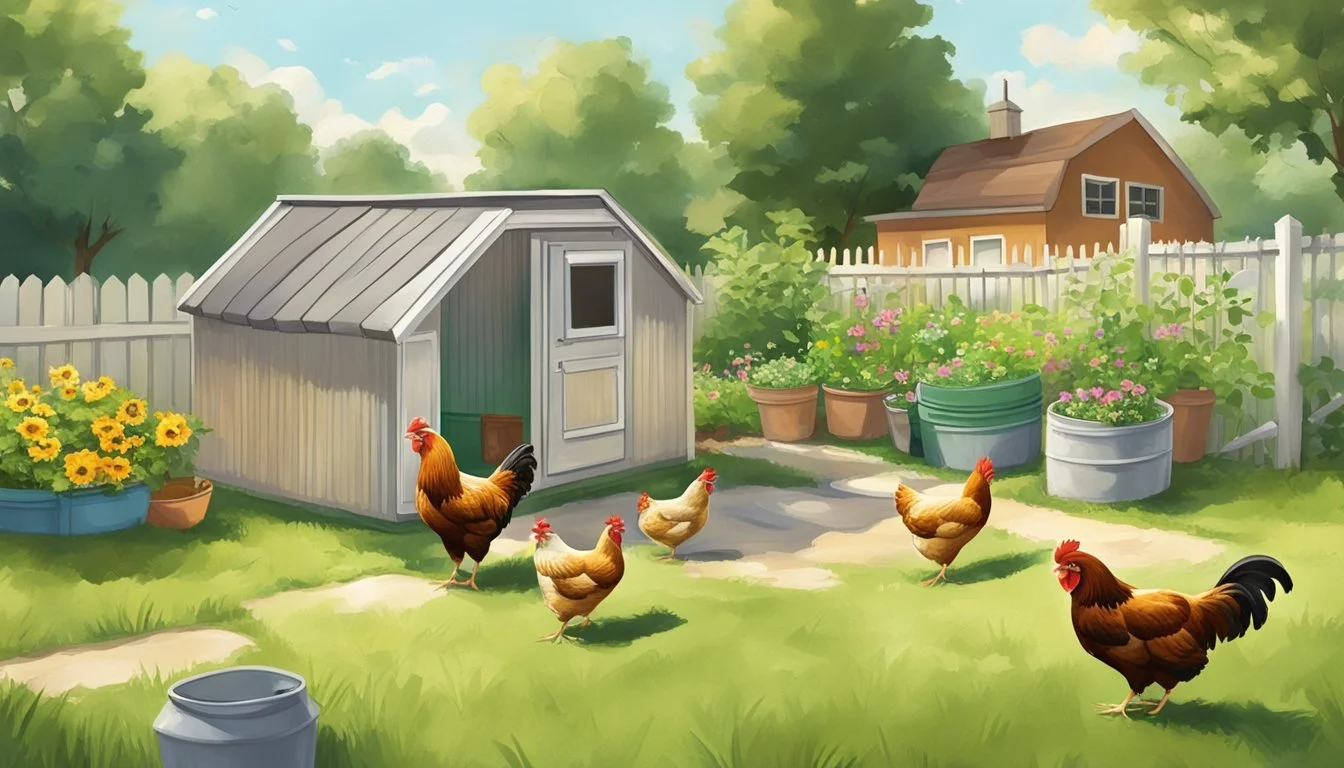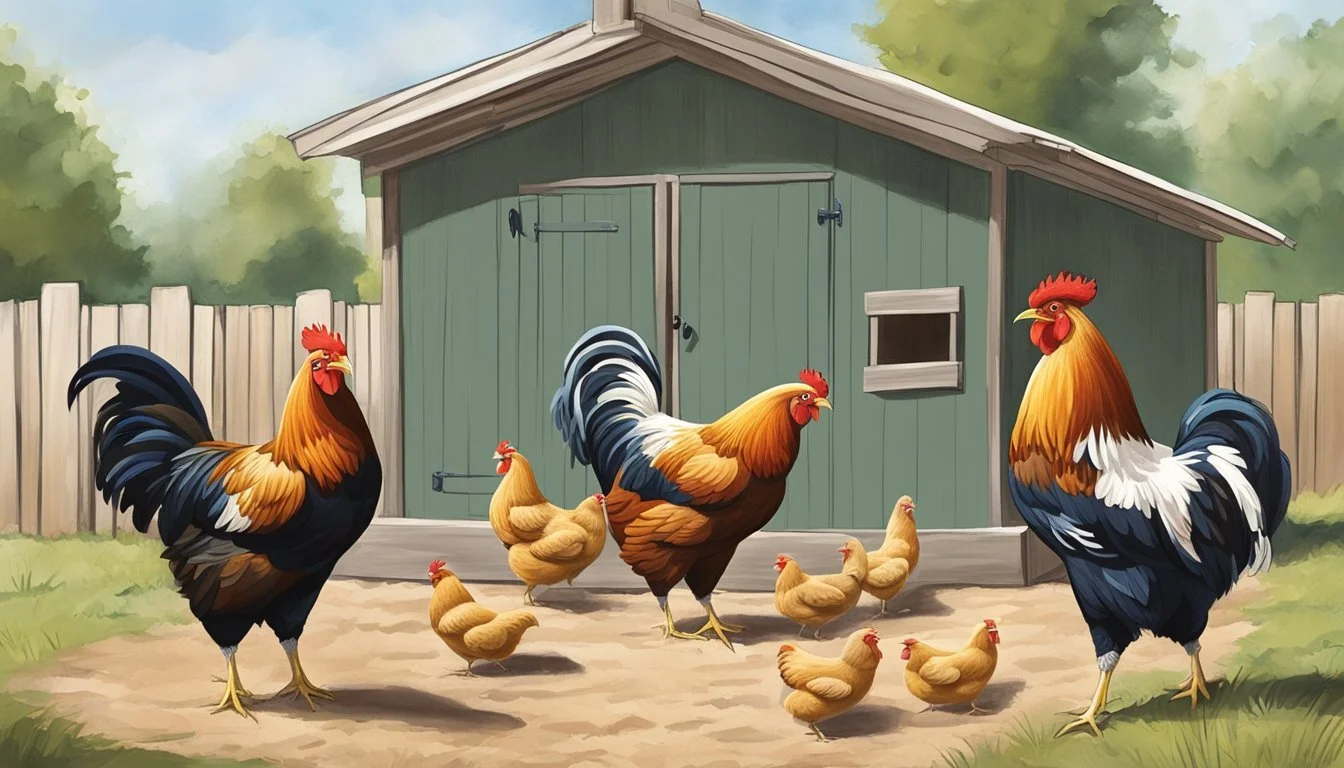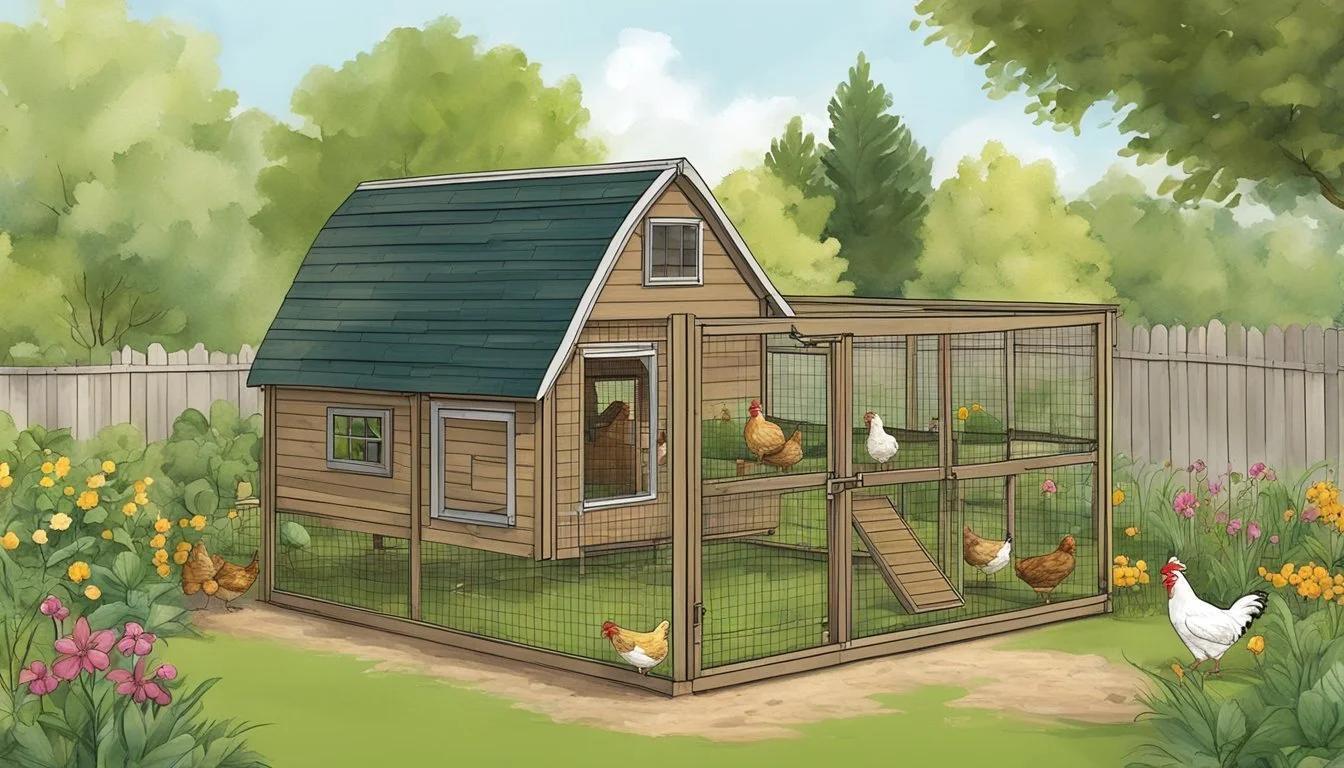Raising Backyard Chickens in Waterloo, IA
Your Essential Guide to Urban Poultry
Waterloo, Iowa, presents a supportive environment for residents inclined towards sustainable living, particularly those interested in raising backyard chickens. The city's ordinances allow homeowners the opportunity to keep chickens, with regulations tailored to maintain harmony between urban living and the benefits of small-scale poultry farming. The law permits residents to house a maximum of eight chickens based on the size of their fenced backyard space, fostering an increase in the number of citizens participating in this self-sufficient practice.
Raising chickens in one's backyard goes beyond merely providing a source of fresh eggs; it embodies a lifestyle choice that emphasizes sustainability and animal welfare. Waterloo's regulations, including a prohibition on roosters and a requirement for additional space per chicken, reveal a commitment to ensuring the well-being of the chickens and minimizing conflict within the community. Adhering to these rules, residents are able to embrace the rewards of poultry husbandry without infringing on the comforts of their neighbors.
The guidelines set forth by Waterloo for keeping backyard chickens underscore a balance between individual hobbies and collective urban etiquette. As the urban agriculture movement grows, the city's stance on backyard chickens indicates an awareness of its residents' changing interests and the need for ordinances that promote responsible animal care within Iowa's changing landscapes.
Understanding Local Ordinances and Regulations
When considering raising backyard chickens in Waterloo, IA, it is imperative to be aware of local ordinances and regulations to ensure compliance.
Waterloo and Iowa Chicken Ordinances
In Waterloo, the city council has established ordinances that allow residents with at least 10,000 square feet of fenced backyard to keep up to two small animals, such as chickens. Additional chickens are permitted for every 2,500 square feet of space beyond the initial requirement, with a maximum limit of eight chickens. These regulations are in place to ensure that backyard poultry does not disrupt local communities and complies with city standards.
Minimum Property Size Number of Chickens Allowed 10,000 sq ft 2 12,500 sq ft 3 15,000 sq ft 4 (and so on) (up to 8)
Roosters are generally banned from backyard flocks to avoid noise complaints.
Zoning Laws and Backyard Chicken Limits
Zoning laws in Iowa may differ by locality, so Waterloo residents should consult their local government to determine specific restrictions. These laws regulate where animals can be kept to maintain public health and safety. The state's chicken ordinances usually permit backyard chickens, but Waterloo has its own specific regulations prescribing the number of chickens based on lot size and zoning requirements.
Residents must ensure their property is zoned appropriately for the keeping of chickens, as residential zones may have different conditions than agricultural or mixed-use zones. The precise regulations can be found in the City Code of Waterloo, Iowa, or by reaching out to the city council's office for the most recent legislation.
Choosing the Right Chicken Breed
When residents of Waterloo, Iowa decide to raise backyard chickens, selecting a breed that thrives in their environment and meets their specific needs is crucial. The breed choice will affect egg production rates, as well as the chickens' ability to withstand local climate conditions.
Egg-Laying and Meat Breeds
Egg Production: For enthusiastic egg collectors, breeds like Lohmann Browns are outstanding layers, producing over 300 eggs annually. They are known for their reliability but also come with a variety of egg colors that can include blues, browns, whites, speckled, and even chocolate colored.
Popular Egg-Laying Breeds Estimated Eggs Per Year Lohmann Brown 300+ Araucana 250+ Sussex 250+
Meat Breeds: Some breeds are raised primarily for meat due to their rapid growth and substantial size. Residents should consider the space and resources available when selecting these breeds, as they often require more feed and space than egg-laying breeds.
Temperament and Climate Compatibility
Temperament: The disposition of the chicken is essential for backyard flocks, especially in urban settings like Waterloo. Docile breeds like Cochins are often favored for their calm nature which makes them less likely to disturb neighbors.
Climate Compatibility: Waterloo's climate can present cold winters, so breeds that are cold hardy, like Sussex and Araucana, are suitable. These breeds have the constitution needed to resist frostbite and other cold-related issues.
Ideal Breeds for Waterloo's Climate Temperament Sussex Friendly Araucana Shy yet hardy Cochin Docile and calm
It should be noted that local laws permit Waterloo residents to keep a certain number of chickens based on property size, influencing breed choice. For instance, if a resident has a standard 10,000 square-foot yard, they can keep up to two chickens, with the ability to add more chickens for every additional 2,500 square feet of space.
Designing and Building a Suitable Coop
When raising backyard chickens in Waterloo, IA, a well-constructed coop is essential for the health and safety of your flock. It provides shelter, protection, and a comfortable living space for your chickens.
Coop Size and Location
The size of the chicken coop should accommodate the number of chickens you plan to keep, with a general rule of 3-4 square feet per bird inside the coop and about 10 square feet per bird in an outside run. Consider future flock expansion when sizing your coop. Location is equally important; the coop should be positioned on high ground to avoid flooding and should face south to maximize sunlight exposure while providing shade areas for hot summer days.
Preferred coop dimensions for a small flock (up to 5 chickens):
Indoor space: 20 square feet (e.g., 5x4 feet)
Outdoor run: 50 square feet (e.g., 10x5 feet)
Preferred coop dimensions for a large flock (10 chickens):
Indoor space: 40 square feet (e.g., 10x4 feet)
Outdoor run: 100 square feet (e.g., 10x10 feet)
Security Against Predators
Chickens are vulnerable to local predators such as raccoons, hawks, and foxes. To protect the flock, the coop's design should incorporate sturdy materials that resist gnawing and digging. Hardware cloth is preferred over chicken wire for enclosures as it provides better protection. Automatic coop doors can be installed to ensure chickens are safely enclosed at night without the owner having to manually close them.
Security tips:
Bury hardware cloth 12 inches into the ground around the coop to prevent digging.
Use locks or predator-proof latches on all coop doors and entry points.
Ventilation, Lighting, and Heating
Proper ventilation is critical to prevent moisture buildup, which can lead to respiratory issues and disease in chickens. Coop lighting simulates extended daylight hours for laying hens, especially during winter months. However, they should mimic natural light patterns to ensure the chickens' circadian rhythms are not disrupted. Coop heating might be necessary during the cold Iowan winters, but care must be taken to prevent fire hazards and to allow the chickens to acclimate naturally to the cold.
Ventilation tips:
Include vents or windows at the top of the coop walls to allow warm, moist air to escape.
Use adjustable ventilation that can be closed during extremely cold weather.
Lighting and heating tips:
Install a timer for lights to provide 14-16 hours of light per day.
Consider a safe heating method like a radiant heat plate rather than heat lamps.
Feeding Your Backyard Chickens
Ensuring your chickens have the proper diet is crucial for their health and egg production. The goal is to provide a balanced intake of nutrients and a suitable feeding system.
Nutritional Requirements
Chickens require a balanced diet that includes protein, carbohydrates, fats, vitamins, and minerals. Layer feed is essential for egg-laying hens as it contains a higher calcium content needed for shell formation. Protein is vital, especially for growing chicks, and should be around 18-20% of their diet. It's important to provide access to clean, fresh water at all times, as it plays a key role in digestion and overall health.
Protein: Needed for growth and egg production.
Carbohydrates: Provides energy.
Fats: Essential for energy and nutrient absorption.
Vitamins and Minerals: Important for immune system, bone health, and overall function.
For chicks, consider starting them on a medicated feed to protect against common diseases. The medication in the feed is designed to prevent coccidiosis, a disease that can affect younger birds.
Types of Chicken Feed and Feeders
There are several types of chicken feed available, each formulated for different stages of a chicken's life cycle:
Starter feed: High in protein, for chicks up to 8 weeks old.
Grower feed: Lower in protein than starter, for chickens 8 to 20 weeks old.
Layer feed: Contains added calcium, for laying hens 20 weeks and older.
For feeding, use chicken feeders that are appropriate for the size and number of your birds. Feeders should be:
Sturdy and stable, to prevent tipping and waste.
Capable of keeping feed dry and clean.
Designed to allow all chickens easy access.
It's important to maintain a regular feeding schedule to ensure your chickens are getting the necessary nutrients throughout the day.
Maintaining Health and Wellness
Raising chickens in Waterloo, Iowa, involves conscious efforts to maintain the health and wellness of the flock. Key considerations include rigorous disease prevention, effective parasite control, and proper management of hens during broody periods and egg incubation.
Disease Prevention and Vaccinations
When it comes to disease prevention, regular vaccinations play a pivotal role. Chickens are susceptible to various diseases such as salmonella and coccidiosis. Owners should consult with a local veterinarian to establish a vaccination schedule that is tailored to the specific pathogens present in the region. The coop and living environment must be kept clean, with waste removed regularly to prevent the spread of disease.
Parasite Control
Effective parasite control is essential in maintaining the poultry's health. Worms can be a common issue, and chickens ought to be treated for parasites periodically. This includes both internal parasites, such as intestinal worms, and external parasites like mites and lice. Proactive measures, including the use of approved anti-parasitic treatments and maintaining a clean habitat, will reduce the occurrence of infestations.
Handling Broody Hens and Egg Incubation
When a hen becomes broody, she may wish to sit on eggs to incubate them. However, not all eggs are destined for hatching; therefore, managing broody hens requires attentiveness. Separating broody hens into a specific nesting area can prevent disruption to the rest of the flock. Those raising chickens for egg incubation must ensure that the incubator is kept at the correct temperature and humidity levels for successful hatching. Cleanliness within the incubator is crucial to prevent any infections during the incubation period.
Maintaining the health and wellness of backyard chickens in Waterloo is an ongoing commitment that requires awareness and attention to detail. By adhering to the guidelines outlined in the subsections, chicken owners can help ensure their flocks thrive in an urban environment.
Daily Care and Husbandry
In Waterloo, IA, the daily routine for backyard chicken care is centered around two primary aspects: maintaining suitable nesting and roosting accommodations, and managing cleanliness, including manure. Adherence to these practices ensures a healthy and productive environment for the chickens.
Nesting and Roosting Requirements
Every chicken requires access to a nesting box where she can lay eggs in privacy and comfort. For the typical backyard flock in Waterloo, one box for every three to four hens is advisable. These boxes should be filled with clean, dry bedding, such as straw or wood shavings, and be placed in the darker, more secluded areas of the coop.
Roosting is where chickens rest and sleep, which is essential for their well-being. A roost should be a horizontal bar or a plank placed high in the coop, away from drafts. Adequate space for roosting is crucial, and it's typically recommended to provide at least 8-10 inches of roosting space per bird.
Cleanliness and Manure Management
Cleanliness in the coop cannot be overstated—it is fundamental to preventing disease and ensuring a comfortable environment for the chickens. It involves regularly checking bedding in nesting boxes and replacing it if soiled or wet. The coop floor should be inspected daily for cleanliness, with droppings and soiled bedding removed.
When it comes to manure management, prompt removal of droppings is essential. They can be added to a compost heap or disposed of appropriately. Some keepers use coop deodorizers to keep ammonia levels down and reduce odors; however, these should be used carefully and be non-toxic to the chickens. Furthermore, a thorough cleaning of the entire coop should be conducted periodically to maintain a hygienic living space.
Managing Flock Dynamics
Effective management of flock dynamics is crucial for ensuring a harmonious environment for backyard chickens in Waterloo, IA. This involves understanding behavior during the integration of new members and strategies to prevent pecking and aggression in the flock.
Introducing New Chickens
When new chickens are added to an existing flock, the transition should be gradual to minimize stress. One method is to place new hens or chicks in a separate but adjacent space where they can see and become accustomed to each other without direct contact. This separation period typically lasts for about a week and allows the birds to establish recognition without confrontation. First introductions should be supervised to monitor interactions.
Gradual introduction steps:
Separation: Keep new members adjacent to the flock.
Supervised Introduction: Allow interactions under watchful eyes.
Integration: Merge them during less active periods, like dusk.
Preventing Aggression and Pecking
Aggression and pecking can be detrimental to a flock's health and well-being. Providing sufficient space for chickens to roam and forage can significantly reduce these behaviors. Additionally, establishing multiple feed and water stations minimizes competition and lowers aggression.
For persistent pecking issues, consider the following:
Distractions: Provide toys or hanging treats to divert attention.
Anti-Pecking Sprays: Apply these to deter pecking on affected chickens.
Creating a structure in the coop where chickens at different pecking order levels can roost separately at night might also help in controlling aggressive behavior. In mixed-gender flocks, one should ensure an appropriate hen-to-rooster ratio; typically, ten hens per rooster are recommended to prevent over-mating and related stress.
Addressing Legal and Ethical Considerations
When raising backyard chickens in Waterloo, IA, residents must navigate a series of legal and ethical considerations, particularly in the areas of slaughtering and egg selling. It is imperative to understand city ordinances and legislation, alongside ethical best practices, to ensure compliance and humane treatment of poultry.
Permits for Slaughtering
In Waterloo, IA, individuals looking to slaughter chickens must first acquire the appropriate permits. The city has specific regulations in place that dictate where and how slaughtering can occur. For instance, one must ensure that the process is conducted in a manner that adheres to both health and animal welfare standards. Permits are usually granted upon proof that these standards will be met.
Health and Safety: Ensure slaughtering areas are clean and free of contaminants.
Animal Welfare: The process should minimize distress and pain to the chickens.
Regulations on Selling Eggs
For those intending to sell fresh eggs, understanding and following local regulations are key. Waterloo has guidelines that regulate the sale of backyard chicken eggs to ensure consumer safety and fair practices.
Packaging and Labeling: Eggs must be properly cleaned, graded, and labeled with pertinent information such as date of collection and grade.
Sales Venue: Eggs should be sold directly from the producer to the consumer or through approved farmers' markets.
Tips for maintaining ethical and legal standards include:
Regularly reviewing local ordinances related to poultry.
Engaging in continuing education about poultry care and ethical slaughtering methods.
Utilizing humane methods for both the keeping and slaughtering of chickens.
Ensuring eggs are collected frequently to maintain freshness.
Enhancing Your Coop with Technology and Accessories
In Waterloo, IA, savvy backyard chicken farmers can modernize their coops with high-tech gadgets and accessories that promote the welfare of their chickens while simplifying maintenance tasks.
Monitoring with Coop Cameras
Coop cameras offer the poultry keeper peace of mind with the ability to keep a close eye on their flock. By installing cameras, one can monitor their chickens for behaviors indicative of stress, illness, or predation. The video feed can be streamed directly to a smartphone or computer, enabling constant surveillance. Here are specifics:
Types: Weatherproof, night vision, motion-activated
Key Features: Remote access, recording capabilities, alerts for unusual activity
Convenience Features
Automatic coop doors are a cornerstone convenience feature that not only secures chickens at night but also gives owners the freedom from the daily routine of opening and closing the coop. Programmable to open and close at specific times, these doors can be fitted with light sensors or timers.
Benefits: Enhances security against predators, streamlines chicken management
Chicken pluckers can significantly speed up the butchering process by removing feathers quickly without damaging the skin. For those who raise chickens for meat, it's a valuable tool that provides efficiency and a cleaner end product.
Operation: Utilize tub-style pluckers with water for best results
Toys for chickens are essential for preventing boredom and promoting natural behaviors such as pecking and foraging. A variety of toys are available, including:
Examples: Mirrors, x-shaped logs, hanging vegetables, or commercial pecking toys
Purpose: Encourage exercise, reduce aggression, stimulate the mind
Incorporating these technologies into a chicken coop greatly streamlines the management of backyard flocks while ensuring their health and safety.
Community and Environmental Impact
Raising backyard chickens in Waterloo, IA contributes to sustainable living practices and fosters a greater sense of community involvement. Responsible management and adherence to local ordinances are crucial for positive integration within the community and minimal impact on the environment.
Integration with Other Small Animals
In Waterloo, residents with adequate space may raise chickens alongside other small animals, such as rabbits and geese. Careful planning is essential to ensure predator-proof enclosures and sufficient runs for the safety and well-being of the animals. They must consider compatibility among different species to prevent potential conflicts and stress.
Responsibility Towards Neighbors and Wildlife
Chicken owners must maintain responsible practices to mitigate any negative impact on neighbors and local wildlife. This includes:
Ensuring cleanliness and sanitation to deter pests.
Implementing proper runs and enclosures to keep chickens contained.
Complying with local regulations, such as limitations on the number of chickens and the prohibition of roosters to avoid noise issues.
Protecting wildlife by preventing chickens from straying into natural habitats, reducing the likelihood of unplanned interactions or the spread of diseases.
Through considerate practices, residents of Waterloo can enjoy the benefits of raising backyard chickens while upholding a harmonious and environmentally responsible community presence.

